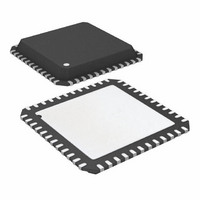ATA6613P-PLPW Atmel, ATA6613P-PLPW Datasheet - Page 181

ATA6613P-PLPW
Manufacturer Part Number
ATA6613P-PLPW
Description
MCU W/LIN TXRX REG WTCHDG 48-QFN
Manufacturer
Atmel
Series
AVR® ATA66 LIN-SBCr
Datasheet
1.ATA6612-EK.pdf
(364 pages)
Specifications of ATA6613P-PLPW
Core Processor
AVR
Core Size
8-Bit
Speed
16MHz
Connectivity
I²C, LIN, SPI, UART/USART
Peripherals
Brown-out Detect/Reset, POR, PWM, WDT
Number Of I /o
23
Program Memory Size
16KB (16K x 8)
Program Memory Type
FLASH
Eeprom Size
512 x 8
Ram Size
1K x 8
Voltage - Supply (vcc/vdd)
2.7 V ~ 5.5 V
Data Converters
A/D 8x10b
Oscillator Type
Internal
Operating Temperature
-40°C ~ 125°C
Package / Case
48-QFN Exposed Pad
Processor Series
ATA6x
Core
AVR8
Data Bus Width
8 bit
Data Ram Size
1 KB
Interface Type
SPI, TWI, USART
Maximum Clock Frequency
16 MHz
Number Of Programmable I/os
23
Number Of Timers
3
Maximum Operating Temperature
+ 125 C
Mounting Style
SMD/SMT
Minimum Operating Temperature
- 40 C
On-chip Adc
10 bit, 8 Channel
Lead Free Status / RoHS Status
Lead free / RoHS Compliant
- Current page: 181 of 364
- Download datasheet (7Mb)
6.15.9.2
9111H–AUTO–01/11
Asynchronous Status Register – ASSR
During asynchronous operation, the synchronization of the Interrupt Flags for the asynchro-
nous timer takes 3 processor cycles plus one timer cycle. The timer is therefore advanced by
at least one before the processor can read the timer value causing the setting of the Interrupt
Flag. The Output Compare pin is changed on the timer clock and is not synchronized to the
processor clock.
Initial Value
Read/Write
• When the asynchronous operation is selected, the 32.768kHz Oscillator for
• Description of wake up from Power-save or ADC Noise Reduction mode when the timer is
• Reading of the TCNT2 Register shortly after wake-up from Power-save may give an
• Bit 6 – EXCLK: Enable External Clock Input
Timer/Counter2 is always running, except in Power-down and Standby modes. After a
Power-up Reset or wake-up from Power-down or Standby mode, the user should be aware
of the fact that this Oscillator might take as long as one second to stabilize. The user is
advised to wait for at least one second before using Timer/Counter2 after power-up or
wake-up from Power-down or Standby mode. The contents of all Timer/Counter2 Registers
must be considered lost after a wake-up from Power-down or Standby mode due to
unstable clock signal upon start-up, no matter whether the Oscillator is in use or a clock
signal is applied to the TOSC1 pin.
clocked asynchronously: When the interrupt condition is met, the wake up process is
started on the following cycle of the timer clock, that is, the timer is always advanced by at
least one before the processor can read the counter value. After wake-up, the MCU is
halted for four cycles, it executes the interrupt routine, and resumes execution from the
instruction following SLEEP.
incorrect result. Since TCNT2 is clocked on the asynchronous TOSC clock, reading TCNT2
must be done through a register synchronized to the internal I/O clock domain.
Synchronization takes place for every rising TOSC1 edge. When waking up from
Power-save mode, and the I/O clock (clk
previous value (before entering sleep) until the next rising TOSC1 edge. The phase of the
TOSC clock after waking up from Power-save mode is essentially unpredictable, as it
depends on the wake-up time. The recommended procedure for reading TCNT2 is thus as
follows:
When EXCLK is written to one, and asynchronous clock is selected, the external clock
input buffer is enabled and an external clock can be input on Timer Oscillator 1 (TOSC1)
pin instead of a 32kHz crystal. Writing to EXCLK should be done before asynchronous
operation is selected. Note that the crystal Oscillator will only run when this bit is zero.
Bit
a. Write a value to TCCR2x, TCNT2, or OCR2x.
b. Wait until the corresponding Update Busy Flag in ASSR returns to zero.
c. Enter Power-save or ADC Noise Reduction mode.
a. Write any value to either of the registers OCR2x or TCCR2x.
b. Wait for the corresponding Update Busy Flag to be cleared.
c. Read TCNT2.
R
7
–
0
EXCLK
R/W
6
0
AS2
R/W
5
0
TCN2UB
R
4
0
I/O
OCR2AUB
Atmel ATA6612/ATA6613
) again becomes active, TCNT2 will read as the
R
3
0
OCR2BUB
R
2
0
TCR2AUB
R
1
0
TCR2BUB
R
0
0
ASSR
181
Related parts for ATA6613P-PLPW
Image
Part Number
Description
Manufacturer
Datasheet
Request
R

Part Number:
Description:
MCU W/LIN TXRX REG WTCHDG 48-QFN
Manufacturer:
Atmel
Datasheet:

Part Number:
Description:
Ata6613
Manufacturer:
ATMEL Corporation
Datasheet:

Part Number:
Description:
BOARD DEMO LIN-MCM FOR ATA6613
Manufacturer:
Atmel
Datasheet:

Part Number:
Description:
DEV KIT FOR AVR/AVR32
Manufacturer:
Atmel
Datasheet:

Part Number:
Description:
INTERVAL AND WIPE/WASH WIPER CONTROL IC WITH DELAY
Manufacturer:
ATMEL Corporation
Datasheet:

Part Number:
Description:
Low-Voltage Voice-Switched IC for Hands-Free Operation
Manufacturer:
ATMEL Corporation
Datasheet:

Part Number:
Description:
MONOLITHIC INTEGRATED FEATUREPHONE CIRCUIT
Manufacturer:
ATMEL Corporation
Datasheet:

Part Number:
Description:
AM-FM Receiver IC U4255BM-M
Manufacturer:
ATMEL Corporation
Datasheet:

Part Number:
Description:
Monolithic Integrated Feature Phone Circuit
Manufacturer:
ATMEL Corporation
Datasheet:

Part Number:
Description:
Multistandard Video-IF and Quasi Parallel Sound Processing
Manufacturer:
ATMEL Corporation
Datasheet:

Part Number:
Description:
High-performance EE PLD
Manufacturer:
ATMEL Corporation
Datasheet:

Part Number:
Description:
8-bit Flash Microcontroller
Manufacturer:
ATMEL Corporation
Datasheet:










